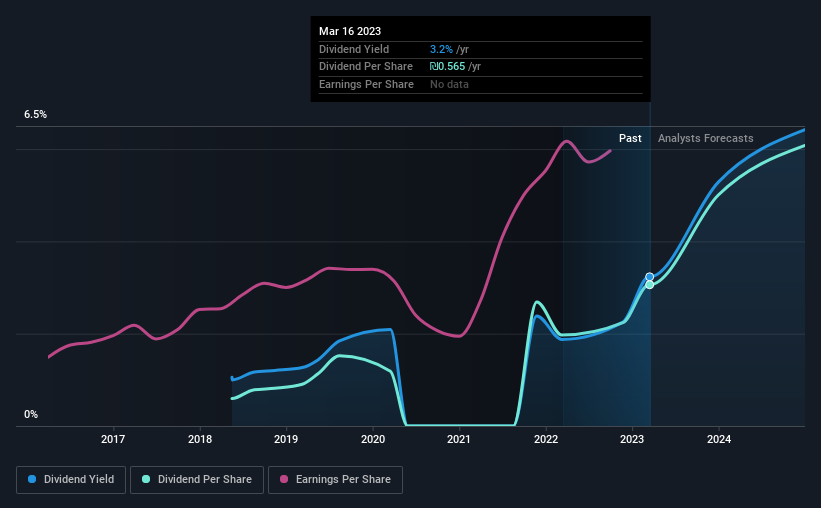Israel Discount Bank (TLV:DSCT) Could Be A Buy For Its Upcoming Dividend

Regular readers will know that we love our dividends at Simply Wall St, which is why it's exciting to see Israel Discount Bank Limited (TLV:DSCT) is about to trade ex-dividend in the next four days. The ex-dividend date is one business day before a company's record date, which is the date on which the company determines which shareholders are entitled to receive a dividend. The ex-dividend date is important because any transaction on a stock needs to have been settled before the record date in order to be eligible for a dividend. Accordingly, Israel Discount Bank investors that purchase the stock on or after the 22nd of March will not receive the dividend, which will be paid on the 30th of March.
The company's next dividend payment will be ₪0.15 per share, and in the last 12 months, the company paid a total of ₪0.41 per share. Based on the last year's worth of payments, Israel Discount Bank stock has a trailing yield of around 3.2% on the current share price of ₪17.48. We love seeing companies pay a dividend, but it's also important to be sure that laying the golden eggs isn't going to kill our golden goose! So we need to check whether the dividend payments are covered, and if earnings are growing.
Check out our latest analysis for Israel Discount Bank
If a company pays out more in dividends than it earned, then the dividend might become unsustainable - hardly an ideal situation. Israel Discount Bank has a low and conservative payout ratio of just 20% of its income after tax.
Companies that pay out less in dividends than they earn in profits generally have more sustainable dividends. The lower the payout ratio, the more wiggle room the business has before it could be forced to cut the dividend.
Click here to see the company's payout ratio, plus analyst estimates of its future dividends.

Have Earnings And Dividends Been Growing?
Stocks in companies that generate sustainable earnings growth often make the best dividend prospects, as it is easier to lift the dividend when earnings are rising. If earnings fall far enough, the company could be forced to cut its dividend. That's why it's comforting to see Israel Discount Bank's earnings have been skyrocketing, up 21% per annum for the past five years.
We'd also point out that Israel Discount Bank issued a meaningful number of new shares in the past year. It's hard to grow dividends per share when a company keeps creating new shares.
The main way most investors will assess a company's dividend prospects is by checking the historical rate of dividend growth. In the past five years, Israel Discount Bank has increased its dividend at approximately 39% a year on average. It's exciting to see that both earnings and dividends per share have grown rapidly over the past few years.
To Sum It Up
Has Israel Discount Bank got what it takes to maintain its dividend payments? Companies like Israel Discount Bank that are growing rapidly and paying out a low fraction of earnings, are usually reinvesting heavily in their business. Perhaps even more importantly - this can sometimes signal management is focused on the long term future of the business. We think this is a pretty attractive combination, and would be interested in investigating Israel Discount Bank more closely.
While it's tempting to invest in Israel Discount Bank for the dividends alone, you should always be mindful of the risks involved. Our analysis shows 2 warning signs for Israel Discount Bank and you should be aware of them before buying any shares.
If you're in the market for strong dividend payers, we recommend checking our selection of top dividend stocks.
New: AI Stock Screener & Alerts
Our new AI Stock Screener scans the market every day to uncover opportunities.
• Dividend Powerhouses (3%+ Yield)
• Undervalued Small Caps with Insider Buying
• High growth Tech and AI Companies
Or build your own from over 50 metrics.
Have feedback on this article? Concerned about the content? Get in touch with us directly. Alternatively, email editorial-team (at) simplywallst.com.
This article by Simply Wall St is general in nature. We provide commentary based on historical data and analyst forecasts only using an unbiased methodology and our articles are not intended to be financial advice. It does not constitute a recommendation to buy or sell any stock, and does not take account of your objectives, or your financial situation. We aim to bring you long-term focused analysis driven by fundamental data. Note that our analysis may not factor in the latest price-sensitive company announcements or qualitative material. Simply Wall St has no position in any stocks mentioned.
About TASE:DSCT
Israel Discount Bank
Provides various banking and financial services in Israel, Europe, and North America.
Flawless balance sheet and good value.
Similar Companies
Market Insights
Community Narratives




